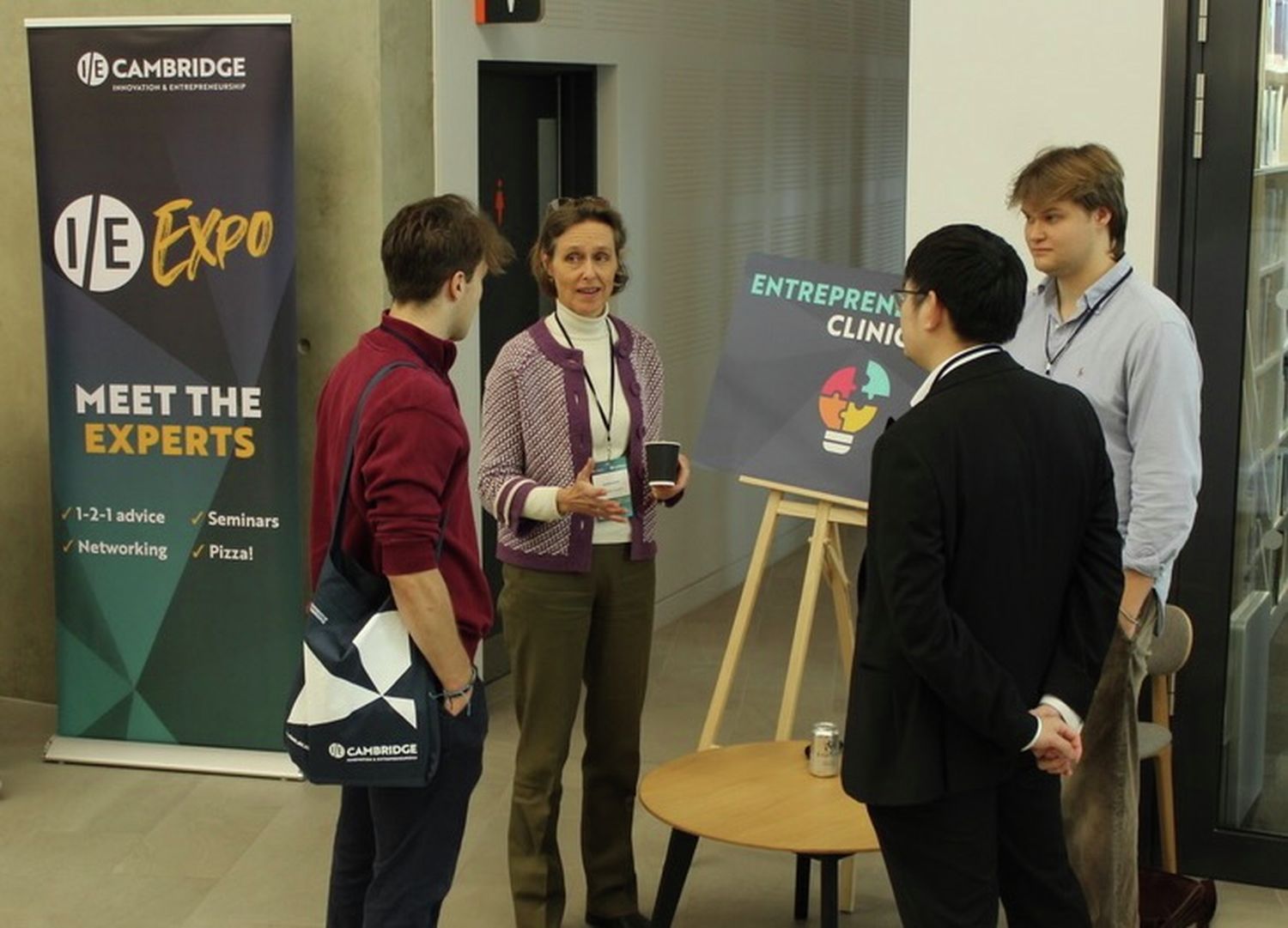If you ask a STEM student what their future career plans entail, the most common answers (aside from ‘I don’t know’) are either research and industry, or finance. However, the reality is, some STEM students will find themselves in an area that combines all three: the world of start-ups. Essentially the very early stages of a business, start-ups (and spin-outs, which use university-owned intellectual property) are the pinnacle of entrepreneurship, and this university is one of the best places to start – no matter what stage you’re at.
At the freshers’ fair in October, the Varsity table stood next to the IE (Innovation and Enterprise) Cambridge stall, an initiative out of Cambridge Enterprise. This is where I met the manager of IE Cambridge, Helen Alexander. “I think people have a misconception about what an entrepreneur is. They maybe think about Elon Musk […] that’s not what a Cambridge kind of entrepreneur looks like. It’s more likely to be a couple of PhD students who are using AI to create an efficiency, or a postdoc working on drug discovery for Alzheimers – it’s people who have seen a real problem, and they have tried to meet that need.” Keen to introduce as many students to entrepreneurship as possible, IE Cambridge aims to serve as a front door, and help students to navigate the support available.
“The university, through Cambridge Enterprise Ventures, has invested over £55 million into over 122 companies”
After showing me around the Cambridge Enterprise building, located out on the West Cambridge campus, we got down to (discussing) business. “Some of our strongest founders didn’t think of themselves as ‘entrepreneurial’ when they started and had no commercial experience, but these skills can be learned and Cambridge is a brilliant place to learn them,” says Helen. “There are so many workshops, societies and training programmes to get stuck in to.” Some of the most successful companies in the UK were started by Cambridge alumni, such as Raspberry Pi, Wayve, and Darktrace.
While the University, through Cambridge Enterprise Ventures, has invested over £55 million into over 122 companies that have come out of the university, funding is ultimately a small aspect of the support available. Cambridge provides an “ideal launch pad,” as Helen put it, to help students transition from academia into these multi-faceted positions. “[We] don’t want these great ideas sitting in piles of academic papers, [we] want them actually being used.”
Alongside Cambridge Enterprise, there are many other enterprise-focussed organisations in the university. One of the more prominent is the King’s Entrepreneurship Lab (E-Lab). I sat down with Sophie Harbour, the director, as she explained how they help students across the university. Founded in 2021, the E-Lab has two main aims: to equip students with entrepreneurial skills, and to inspire students to pursue their ventures. They achieve this through the wide range of events and residentials that they host, spanning from workshops for pitching and tech, to hosting the founders of Hotel Chocolat, and even Will.i.am.
“Don’t wait for it to be perfect […] don’t wait to test it further”
Lots of these programmes aim to help students foster that entrepreneurial mind-set, but what about once you’ve got the idea? “Don’t wait for it to be perfect […] don’t wait to test it further,” says Ann Davidson, head of the Entrepreneurship Centre at the Cambridge Judge Business School. “Entrepreneurship is about risk. Have the confidence to offer up your product or service and say ‘help me take it forward’ – [get] feedback from coaches and mentors.” Accelerate Cambridge is a startup ‘accelerator’ established by Cambridge Judge Business School, and hosts an 11-week programme that aims to empower entrepreneurs through a series of “talks, workshops, weekly coaching and biweekly mentoring and pitching”. Another thing Ann emphasised was the necessary commercialisation that needs to take place in the early stages of a business: “What are you worth? What can you offer to the market? How can we make money from this? That’s important – a lot of people shy away from that, but even if you’re a social enterprise you still need to make money.”
At the same IE expo event where I met Sophie and Ann, numerous entrepreneurs, founders and heads of programmes spoke about what it means to be in this field. “Kick down the door – don’t wait for perfection,” said Devon Bailey, co-founder of BRDG The Gap, a “freelancer platform that connects skilled individuals – including students, professionals, and self-taught experts – with businesses and clients seeking their services.”
I also met Sarah Broderick, co-founder of Highland Light. They’ve started by developing personal protective equipment for divers that allow them to dive up to 100 metres deep, where the pressure is ten times higher than atmospheric pressure. Her main piece of advice? “Talk to someone else. Find those little things that someone else is doing in your ecosystem and start asking them questions about it […] you’ll find out more, and it helps – it makes it so it’s a small little incremental step, not a big thing.” Highland Light is a member of IdeaSpace, the University’s co-working space for start-ups, and their rebreather systems are often used by media divers. This includes the divers that discovered that sperm whales sleep vertically, instead of horizontally, while filming for David Attenborough’s Blue Planet.
“There are opportunities here – you just have to say yes to all of them”
Some of the most valuable voices on student entrepreneurship are, of course, those of student entrepreneurs. A second-year chemical engineering and biotechnology student at Queens’, Femi Owolade-Coombes, has been involved in entrepreneurial ventures for a decade. Starting with running workshops in South East London to help young people develop entrepreneurial skills, this has progressed: two years ago he went to Brunei as a consultant, offering advice on how they can establish a stronger entrepreneurial ecosystem. “One key thing for me: a can-do attitude […] get an idea and run with it. Recognise those blocks and barriers and overcome them.” As an undergraduate, Femi is no stranger to the workload and challenges that accompany the privileges of being at Cambridge – his current projects involve working with IE Cambridge to make enterprise more accessible, and developing the ecosystem through entrepreneurial toolkits.
Slightly frost-bitten, I sat down in Catz bar with Uliana Ronska – a third year mathmo. “I like working on random small projects, which then become not random and not small.” As a Ukrainian international student, she found applying to universities outside of Ukraine difficult. So, she built a website, which has grown to a collection of over 90 stories from international students, to provide the support to successive students that she didn’t have.
This energy has carried on into her time in Cambridge: “I treat Cambridge in some sense as a playground […] it’s so easy to meet other people who want to do things with you.” At the start of November she helped organise the largest hackathon yet at the university, and we’d had to move our meeting a day earlier because she was heading into London to volunteer at the Oxbridge AI Challenge semi finals – she’d agreed to help out only two days before. “There are opportunities here – you just have to say yes to all of them.”
Cambridge is brimming with incredible ideas, minds, and programmes – the support is widespread and becoming evermore accessible. “We should be celebrating more as a university,” said Helen, “we should be proud of our entrepreneurial alumni.” There is no better place to get involved in enterprise: whether you’ve not got a clue about entrepreneurship, or you’re hoping to revolutionise silicon valley, it’s time to kick down the door.
More information can be found at ie.cam.ac.uk.


